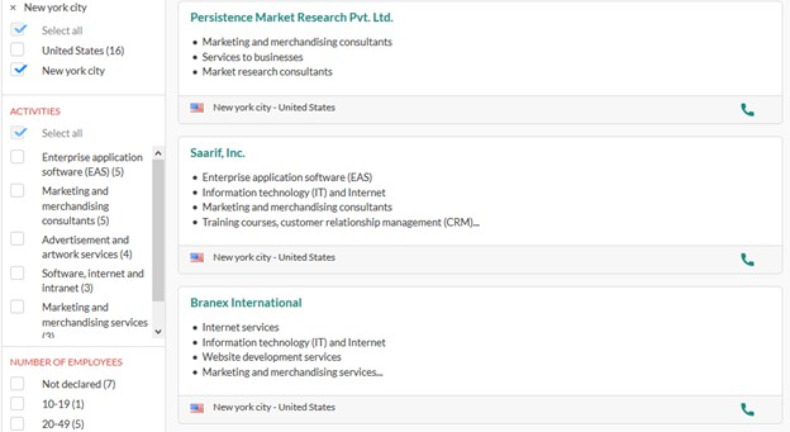Growing your backlink profile is an indispensable part of your B2B marketing efforts. But if you're new to link-building, it can seem daunting at first.
Don't worry, though. In this article, you'll learn how to build the kind of links that get results.
What is link-building?
Link-building refers to actively trying to increase your site's number of backlinks—links from another website to yours.
Link-building is an essential part of search engine optimization (SEO). If a lot of high-authority sites link to yours, Google and other search engines will determine that your website is likely authoritative and of high quality. Your site will then rank higher on search engine results pages (SERPs).
Link-building has the secondary benefit of driving new traffic directly from the linking site to yours. Anything that introduces your company to relevant new audiences is good news for your business.
How can B2B marketers build links?
Some unscrupulous marketers have a habit of paying for backlinks from any website that will accept their money. I advise against that strategy. Even if you know what you're doing, it's dangerous. If you get caught, you risk incurring a Google penalty, which can have a serious impact on your SERP ranking.
This article will guide you through more above-board ("white hat") ways to build links as part of your B2B marketing efforts.
But before you start, you need to understand what your backlink profile currently looks like and what your target number of links should be. You can use a tool like the Ahrefs backlink checker to see how many backlinks you have and check their quality.

Two metrics matter in this case. First, the number of relevant quality backlinks from unique domains will help build up your site's domain rating (DR)—that is, the chance that a piece of content will rank organically. Second, review the number of relevant high-quality referring domains for your page. The more referring domains it has, the higher the chance it will rank in SERPs.
I've used the word "quality" several times. Google defines quality according to three important criteria:
- Number of visitors to your site: generally linked to the site's DR or DA
- Relevance of the link: whether the site operates in the same niche as yours
- Trust flow: how trustworthy the sites are that are link to the domain
With that snapshot of how to assess backlink quality established, let's look at some of the best link-building strategies for B2B marketing.
Guest-Posting
A guest post is an article that you write to be published on someone else's site in exchange for a link back to yours. Follow these steps to secure guest posting opportunities:
- Perform a Google search for relevant keywords you'd like to rank for. Find the top-ranking result that is not a paid ad.
- Enter that site's URL into the Ahrefs backlink checker or another competitor intelligence solution to see the referring domains.
- From the list of referring sites, create a shortlist of ones you'd like to write guest posts for. Focus on those with a DR of 50+.
- Check which sites from your shortlist are accepting guest posts. Many websites that feature guest posts will have a "Write for Us" or "Contribute" page explaining the process. Follow any instructions the site gives on how to be considered for a guest-posting spot. If the site doesn't specify that it accepts guest posts, it's fine to reach out to ask. Use an email finder like Voila Norbert, Hunter, and ContactOut (Chrome extension) to get the details on an editor or site owner.
- Send a brief but friendly email to the website owner. Explain who you are and what you do, and offer a guest post. Make sure you're offering value—i.e., expertise to share with the site's audience. You are proposing a collaboration for mutual benefit, not asking for a favor.
When an editor accepts your proposal for a guest post, it's your job to deliver the content you promised. Tempting though it may be to cram as many links as possible into the article, stick with one or two relevant links to your site.
Link Reclamation
If someone has mentioned your brand in a blog post or a forum post but has not linked back to you, you're missing out on a potentially valuable link. If you spot a such a mention, send a friendly email to the site owner or editor. Thank them for the shout-out and ask whether they'd be willing to add a link.
In addition, if someone has used copyrighted material of yours (such as a picture or infographic), you can usually get a quick backlink by emailing the post author and asking for attribution. You're also within your rights to request that the material be taken down—and, in some cases, that might be your best strategy if you're dealing with a low-authority or dodgy site. If the site is of decent quality, however, you're better off requesting a backlink.
Finally, you can reclaim links by fixing broken links. Here's how:
- Perform a Google search for a relevant keyword.
- Review the highest-ranking content. Are the posts linking to a page that no longer exists? You can use a tool such as Broken Link Checker to find broken links on a page.
- Contact the site owner to let them know about the problem and ask them to fix it. Offer a suitable replacement link (to content on your own site, of course).
Listing in Relevant Directories
Is there a business directory website for your industry or niche? Take the time to add your listing and ensure it's up to date. It usually only takes a few minutes, and it's an easy way to add a backlink.
Industry directories are trusted and high-ranking sources, so the backlink is likely to be of high quality. However, the value of the link is likely to be low, because links of this type are easy to acquire.
Here's an example from Kompass, a respected B2B directory with a DR of 67:

But don't just list your business anywhere. Doing so can harm your SEO efforts and undo your good work. Instead, seek out relevant directories in your niche that have high DR.
HARO
Help A Reporter Out (HARO) is an online service that links bloggers and journalists to expert sources. Set up a free account and select the subjects and industries relevant to your business. You'll receive a daily roundup of requests by email, and you can choose which ones to respond to. If a writer uses the information you provide, you'll usually get a link to your site or resource in the published piece.
Be aware, though, that HARO can eat up a lot of your time if you're not careful, and you can never guarantee that your quotes will be used. Respond only when queries are directly relevant to your business niche, and when having a link from that outlet would benefit you.
Establishing Yourself as an Authority
This strategy takes some time, but it's worth the effort. If you consistently publish high-quality, valuable content and establish yourself as a go-to expert in your industry, other writers and site owners will naturally start linking to you.
Imagine your company sells an email marketing solution to small businesses, and as part of your content strategy you publish free tutorials about business website marketing. Well-known marketing bloggers with a high DR site might publish a post about the subject and link to you, just because they love your content and want to tell their audiences about it.
It takes time to start getting backlinks like this, but when you do, they're the strongest backlinks of all.




